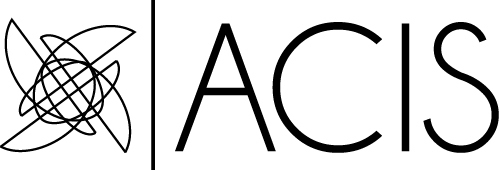
It is hardly surprising that a joint conference of the ACIS and the CAIS entitled “Irish Studies in an International Context” would feature panels on “The International and Intertextual Kate O’Brien,” “International Contexts,” “Irish Theatre in an International Context,” and many more. In addition, while several panels focused on such complementary or related matters as “Transnational Lives and Identities” and “Teaching Transnational History”—and a “Transnational Ireland Research Network Meeting” was convened—others discussed Irish topics within the larger parameters of the global and world literature, or as imbricated within specific networks like the “imperial.”
Perhaps the most powerful of such networks—the uber imperial of the imperial, we might say—is the “digital” and its vast cyberspace where we work and play every day. The conference featured “Digital Humanities and Irish Studies: A Two-Part Workshop on Pedagogy and Practice,” organized by Nicholas Wolf, Margaret Kelleher, and Geraldine Meaney, and “Irish Studies and International Scholarly Discourse in a Digital Age,” a session dedicated to the founding and evolution of the very journal you are reading. Editors of Breac discussed methods of kindling “digital scholarly conversation,” a desideratum also resonating in such sessions as “Irish Theatre in an International Context,” featuring commentary by John Harrington, Patrick Lonergan, Nicholas Grene, Jose Lanters, and Helen Lojek. At this latter meeting, Lonergan and Harrington sketched the history of the Irish Theatrical Diaspora Project initiated in 2004, and Lojek described the importance of the Project’s growing digital archive to scholars living as far away from Ireland as Boise, Idaho. For theater scholars living in the States, especially those residing at some distance from New York, Chicago, or other hubs of robust theatrical production, digital archives including scripts, design, and video are vital to their intellectual lives.
All of these matters raised several questions for me, destabilizing or troubling terms that I often take for granted. Take “Irish,” for instance: What pressures are exerted on its connotation when elements of the international are introduced? Patrick Lonergan raised this issue in regard to the terms “Irish drama” and “Irish play,” asking if Conor MacPherson’s The Night Alive (2013), produced in London and New York but not yet in Dublin, is an Irish play? Or John Patrick Shanley’s Outside Mullingar, a play set in Ireland written by an Irish-American playwright that had its premiere in New York this past January, yet heretofore has not been produced in Ireland. Nicholas Grene posed a slightly different problem when noting that the canon of modern Irish drama looks quite different in some European contexts, where such transformative plays as Brian Friel’s Translations was very slow to find an audience and thus its place in the canonical hierarchy.
And what about international and digital scholarly conversation? Archives and conversation are good things, to be sure, but what about more formal scholarly discourse—a.k.a. publications—in digital forms? Because these are implicated within the evaluative metrics of scholarly advancement—job placement, promotion—the disciplines in which we work must know how to “count” or value electronic publication. I think most do, these days, when it comes to scholarly articles and notes, but I’m not sure I’m right about this. How does this fact constrain collegial conversation?
Like “Irish,” then, which may be redefined by the international, “conversation” may be delimited by the digital.
